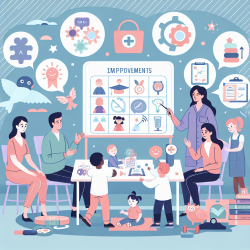Introduction
Adolescent motherhood is a significant challenge, particularly in low-income and high-density communities. In Zimbabwe, many young mothers face social isolation and stigma, which can lead to poor mental health outcomes. A recent study, "Testing the Effectiveness of a Community-Based Peer Support Intervention to Mitigate Social Isolation and Stigma of Adolescent Motherhood in Zimbabwe," explored how peer support can address these issues.
Understanding the Study
The study involved community health workers and peer educators facilitating peer support groups for adolescent mothers aged 15-18 in Harare, Zimbabwe. These groups met twice a month and covered topics such as income generation and depression. The intervention aimed to reduce depressive symptoms and increase social support.
Key Findings
The intervention arm showed significant improvements in mental health and social support compared to the control group. Participants reported feeling less isolated and more engaged with peers and significant adults. They developed new coping, parenting, and communication strategies, which helped them manage life challenges more effectively.
Implications for Practitioners
For practitioners, this study highlights the importance of peer support in addressing social isolation and stigma among adolescent mothers. Here are some ways to implement these findings:
- Establish peer support groups in your community to provide a safe space for adolescent mothers to share experiences and receive support.
- Utilize technology like WhatsApp to facilitate communication and support among group members.
- Engage community stakeholders to foster a supportive environment for young mothers.
- Incorporate topics relevant to the participants, such as mental health, income generation, and parenting skills, into group sessions.
Encouraging Further Research
While the study provides valuable insights, further research is needed to explore the long-term effects of peer support interventions and their applicability in different contexts. Practitioners are encouraged to contribute to this growing body of research by documenting their experiences and outcomes.
Conclusion
Community-based peer support interventions have the potential to significantly improve the lives of adolescent mothers by reducing social isolation and stigma. By implementing these strategies, practitioners can help create better outcomes for young mothers and their children.
To read the original research paper, please follow this link: Testing the Effectiveness of a Community-Based Peer Support Intervention to Mitigate Social Isolation and Stigma of Adolescent Motherhood in Zimbabwe.










